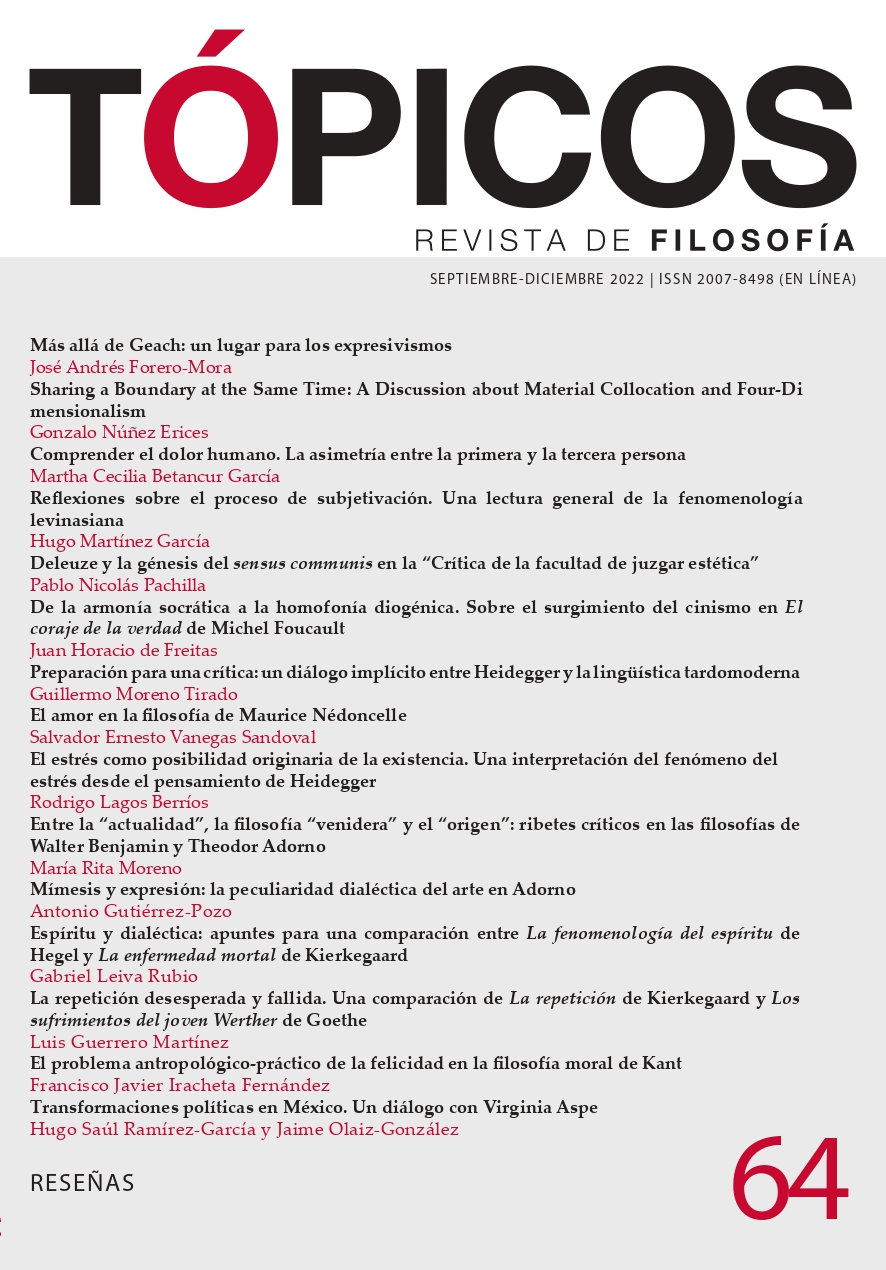Publiée 2022-08-13
Mots-clés
- transformaciones políticas,
- cuarta transformación de México,
- constitucionalismo,
- cambio constitucional,
- lopezobradorismo
- filosofía de la liberación ...Plus
(c) Copyright Tópicos, Revista de Filosofía 2022

Ce travail est disponible sous licence Creative Commons Attribution - Pas d'Utilisation Commerciale - Pas de Modification 4.0 International.
Comment citer
Résumé
In “The Political Dilemmas of Mexico’s Transformations: A Philosophical Approach” (Tópicos, Revista de Filosofía 58), Virginia Aspe explores the character of political transformations in Mexico addressing the following questions: a) What does the notion “political transformation of Mexico” entail? b) What are the philosophical arguments behind the three political transformations that Mexico has experienced since the 19th century? c) What are the political arguments with which the so-called “fourth political transformation” of Mexico is being promoted? Our article offers a series of arguments to begin a conversation on some of the most salient contentions of professor Aspe regarding the phenomenon of political transformation lato sensu and the political transformations that Mexico has undergone, asking ourselves, specifically, if the rise of Obradorism to power can really be incorporated into that theoretical field with which Mexcan political history has been articulated.
Téléchargements
Références
- Albert, R. (2019) Constitutional Amendments: Making, Breaking, and Changing Constitutions. Oxford University Press.
- Arendt, H. (2006). On Revolution. Penguin Books.
- Aspe Armella, V. (2020). Los dilemas políticos de las transformaciones de México: una aproximación filosófica. Tópicos. Revista de Filosofía, 58, 375-410.
- Brinton, C. (1952). The Anatomy of Revolution. Prentice Hall.
- Cámara de Diputados (2021, 28 de mayo). Sumario de Reformas a la Constitución Política de los Estados Unidos Mexicanos, por decreto en orden cronológico. En Cámara de Diputados. LXV Legislatura. URL: http://www.diputados.gob.mx/LeyesBiblio/sumario/CPEUM_sumario_crono.pdf.
- Comanducci, P. (2011). Constitucionalismo: problemas de definición y tipología. Doxa. Cuadernos de Filosofía del Derecho, 34, 95-100.
- Córdova, A. (1972). La formación del poder político en México. Era.
- Dussel, E. (2006). 20 tesis de política. Siglo XXI.
- (2011). Filosofía de la liberación. Fondo de Cultura Económica.
- Elster, J. (1991). Constitutionalism in Eastern Europe: An Introduction. The University of Chicago Law Review, 58(2), 447-482.
- Fioravanti, M. (2007). Constitución. De la Antigüedad a nuestros días. M. Martínez Neira (trad.). Trotta.
- Fowler, W. (2010). Forceful Negotiations: The Origins of the Pronunciamiento in Nineteenth-Century Mexico. University of Nebraska Press.
- Fukuyama, F. (2011). The Origins of Political Order. From Prehuman Times to the French Revolution. Farrar, Straus and Giroux.
- González San Martín, P. (2019). La filosofía de la liberación de Enrique Dussel. Genealogía de un ejercicio teórico en/para América Latina. Estudios de Filosofía Práctica e Historia de las Ideas, 21, 14-15.
- Guerra, F.-X. (1991). México: del Antiguo Régimen a la Revolución. Tomo II. Fondo de Cultura Económica.
- Hernández, E. (2006). El clientelismo en México: los usos políticos de la pobreza. Espacios Públicos, 9, 118-140.
- Huntington, S. (2006). Political Order in Changing Societies. Yale University Press.
- Hurtado, G. (2019). Apuntes sobre la transformación de México. En G. Hurtado, J. A. Torres y G. Vargas (eds.), La filosofía y la cuarta transformación de México. (pp. 21-34). Editorial Torres Asociados.
- López Obrador, A. (2017). 2018. La salida. Planeta.
- Mudde, C. y Rovira, C. (2017). Populism: A Very Short Introduction. Oxford University Press.
- Olaiz, J. (2015). At the Turn of the Tide: A Framework for a Policy-Oriented Inquiry into Strategies for the Transformation of the Constitutive Process of Authoritative Decision in Mexico. [Tesis doctoral]. Escuela de Derecho de Yale. URL: https://digitalcommons.law.yale.edu/ylsd/6.
- Retamozo, M. (2007). Enrique Dussel. Hacia una Filosofía política de la Liberación. Notas en torno a “20 tesis de política”. Utopía y Praxis Latinoamericana, 12(36), 107-123.
- Spaemann, R. (1998). Persons. The Difference Between ‘Someone’ and ‘Something’. Oxford University Press.
- Strauss, D. (1999). What is Constitutional Theory? California Law Review, 87, 581-592.
- Strauss, L. (2014). ¿Qué es filosofía política? Y otros ensayos. J. García-Morán Escobedo (trad.). Alianza.





